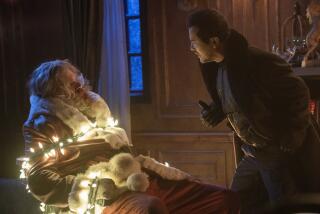Review: It has wit and energy to burn, but ‘Ralph Breaks the Internet’ takes a cynical turn
- Share via
The title of “Ralph Breaks the Internet” is a small tour de force of multitasking: a plot summary and a meme reference rolled into one. It also signals to the audience that they’re in for a bigger, crazier, more aggressively rock-’em-sock-’em adventure than “Wreck-It Ralph,” the sweetly rambunctious 2012 Disney animated comedy about a community of analog video-game characters who spring to vibrant digital life when their arcade closes down for the night.
For better and for worse, this sequel indeed dishes out a lot more noise and destruction, which means it also offers a lot more to look and marvel at beforehand. This is neither a surprise nor a contradiction. Co-directed by Rich Moore (the solo director of “Wreck-It Ralph”) and Phil Johnston, “Ralph Breaks the Internet” is a witty, fastidiously imagined adventure and a touching, sometimes troubling ode to the power of friendship. But it also demonstrates some of the problems that can befall a movie when its vast ambition and confidence outstrip its finesse.
Not much seems to have changed when we return to Litwak’s Family Fun Center & Arcade, where that huge-fisted lug Wreck-It Ralph (voiced by John C. Reilly), the designated villain of a game called “Fix-It Felix,” now lives in joyous communion with his pixelated pals. And no one loves Ralph more than Vanellope von Schweetz (Sarah Silverman), his best bud and delightfully incongruous sidekick. The glitchy, pitchy Vanellope remains something of a misfit heroine in her high-speed racing game, “Sugar Rush,” and she’s increasingly bored with its well-worn race tracks and retina-searing Candyland colors.
But something even sweeter and speedier has come to the arcade. That would be wireless internet service, a shiny emblem of a brave new technological frontier that initially seems likely to put games like “Sugar Rush” out of business. If so, those apocalyptic adventures will have to await a future sequel. Unlike, say, Pixar’s masterly “Toy Story” movies, which similarly follow a community of childhood playthings come to life, “Ralph Breaks the Internet” does not mean to confront its characters with the threat of their own obsolescence.
RELATED: ‘Grinch,’ ‘Ralph’ and ‘Spider-Man’ lead an animated charge on the holiday box office »
The internet may be a wild, scary and confusing place, but the canniest idea in Johnston and Pamela Ribon’s script is that it is also an endless source of renewal — a means by which old and outmoded pop-cultural artifacts might reclaim the love of a small but passionate fan base. The movie hints at this possibility early on when Ralph, trying to help Vanellope out of her rut, accidentally causes serious physical damage to her game. It can only be repaired with the purchase of a replacement “Sugar Rush” steering wheel, the last remaining version of which is being auctioned off as a collector’s item on EBay.
The arcade’s owner, Mr. Litwak (Ed O’Neill), is unwilling to pay and promptly unplugs “Sugar Rush,” sending Vanellope and the other, meaner girl racers fleeing into the other games for cover. But Ralph and Vanellope are determined to save her game, even if it means beaming themselves up to the internet, tracking down EBay and acquiring enough convertible currency to buy the wheel themselves.
This is easier said than done, and it is perhaps even harder to visualize. Fortunately, the filmmakers have done that part for us. The most impressive aspect of “Ralph Breaks the Internet” may be Cory Loftis’ production design, which brilliantly renders the online world as a gleaming, teeming futuristic metropolis. Humans surfing the internet are represented by their own byte-sized digital avatars, soaring across the cityscape like happy little e-consumers. Skyscrapers bear the instantly recognizable logos of major tech conglomerates (Google, Amazon, Fandango), plus more than a few fictional knockoffs. Add some fog machines and dreamy nocturnal lighting and you could call the whole thing “Blade Router.”
This animated internet is an eye-popping simulacrum of the real thing, but it is also thoroughly sanitized, as the conventions of PG-rated, family-friendly entertainment demand. A truer, uglier vision might have dared to show us the inner mechanisms of a nasty Reddit thread or a Twitter bot, or ventured down a more adult alley or two. (The wisdom of “never read the comments” is at least shrewdly upheld.) The story’s edgiest environment is an online game called “Slaughter Race,” a violent, sun-streaked world of fast cars and leather-jacketed drivers — none cooler than the game’s ringleader, Shank (Gal Gadot) — that suggests a cross between “Grand Theft Auto” and “Sharknado.”
Vanellope, her toughness perfectly matched by Silverman’s sharp-witted, squeaky-voiced delivery, is completely seduced by “Slaughter Race,” a development that cleverly bears out the notion that we are not always what we appear to be. (An original ballad, performed by Silverman and Gadot, spells out this theme in amusing if too-obvious fashion.) Ralph, however, reacts with predictable horror to the prospect that Vanellope might abandon him, and he does everything he can — which is a lot, given that he’s Wreck-It Ralph — to derail her plans.
There are some resonant ideas at play here, among them the realization that toxic male insecurity, even under the guise of love and friendship, can make the internet a uniquely volatile and dangerous place. For the most part, those ideas are realized with sly visual wit and conceptual ingenuity — the most delightful new character is a squat, bespectacled search engine named KnowsMore (perfectly voiced by Alan Tudyk) — and interlaced with the cheeky, sophisticated humor that has become synonymous with the Disney/Pixar brand.
At one point that brand turns inward on itself, as Vanellope stumbles on the online headquarters of the one and only Magic Kingdom. And it is here, though not only here, that “Ralph Breaks the Internet” begins to unravel, thanks to a queasy-making blend of fan service and corporate promotion. If you aren’t tickled by the Imperial Stormtroopers, you’ll probably laugh pretty hard at the scene in which Vanellope meets the full Disney princess sorority: Snow White, Cinderella, Aurora, Ariel, Belle, Jasmine, Moana and Tiana, among others.
To be sure, it’s a wickedly clever sequence, if not as good-humored or surreally inspired as the “Happy Working Song” number from “Enchanted” (2007), probably the last picture in which Disney skewered itself so audaciously. It doesn’t help that in the 11 years since, this mass-entertainment conglomerate has ballooned to ever more unwieldy proportions, which may explain why the princess bit here plays like self-aggrandizement masquerading as self-deprecation. If you think the joke’s on Disney, really, the joke’s on you.
And that smugness cannot help but infect and pervade the entire enterprise, not unlike the nasty web virus that gets unleashed en route to the movie’s climactic action spectacle. “Ralph Breaks the Internet” is a barbed sendup of our 24-7 internet culture that ultimately falls victim to the sheer, bloated excess of what it’s trying to satirize. Ralph’s mission to save Vanellope and their friendship involves, among other things, his ability to market himself as a YouTube-style sensation and earn tens of thousands of “likes” — a process enabled in part by an algorithmic intervention of a CEO named Yesss (Taraji P. Henson).
Naturally, Ralph, goodhearted galoot that he is, will learn the error of trying to control his friends, and also the folly of trying to commodify things such as respect and affirmation. But his lessons seem to come increasingly at the expense of the audience, whose sheep-like complacency the movie treats, with unearned and unexamined cynicism, as a given. The more Ralph begs for likes, the more “Ralph Breaks the Internet” cannot help but push yours away.
------------
‘Ralph Breaks the Internet’
Rating: PG, for some action and rude humor
Running time: 1 hour, 51 minutes
Playing: Opens Nov. 21 in general release
[email protected] | Twitter: @JustinCChang
More to Read
Only good movies
Get the Indie Focus newsletter, Mark Olsen's weekly guide to the world of cinema.
You may occasionally receive promotional content from the Los Angeles Times.











